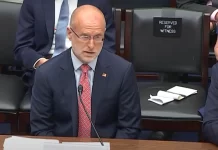Illinois retiree says Amendment 1 on the November ballot could cost her home by increasing property taxes.
When Deb Cohorst reached retirement age, she didn’t expect to face possibly leaving the rural town she’s loved for close to 40 years. Gov. J.B. Pritzker’s tax hikes have not helped.
“I have lived in Illinois for almost 40 years. My husband was born and raised here in Effingham, and we like it here. We feel like this was a great place to raise our kids, but frankly, I’m worried how much longer we can stay here because we are both retired. And with the rising property taxes and gas taxes, it’s becoming harder to survive on a fixed income,” Cohorst said.
In 2019, Pritzker and the Illinois General Assembly passed 24 tax and fee hikes, including a doubled gas tax. During Pritzker’s term, the average family has seen a net tax hike of $2,165 and faces the second-highest property taxes nationally, leaving fixed-income retirees such as Cohorst wondering if they’ll ever see relief.
“Property taxes are another thing that we’re really worried about, and it scares me we may have to move. I have friends in neighboring states, and they cannot believe what we’re paying in property taxes,” Cohorst said. “I am paying more for the property tax on my half-acre lot than my three out-of-state friends’ property taxes combined.”
Effingham, Illinois, is located just southeast of Springfield. The median household income is about $52,551 and 19% of residents such as Cohorst have reached retirement age. The average home value in Effingham is $136,000 and families pay $2,328 in property taxes, or an effective tax rate of 1.7%, which is higher than the national average of 1.1%, according to the U.S. Census Bureau.
“It’s not tens of thousands like some other families pay. But when you’re on a fixed income – and the people in this area don’t earn like what they earn in Chicago or some of the bigger cities, at our wage level, it’s getting harder and harder to keep up as property taxes keep increasing and we’ve seen the effect that’s having,” Cohorst said.
When property taxes cost roughly 4.4% of your income, Cohorst and other retirees have trouble finding spare cash to sustain never-ending tax hikes.
Pritzker has failed to keep his campaign promise of property tax relief for families. Instead, the median homeowner paid $2,288 more in property taxes during his administration, according to an Illinois Policy Institute analysis.
This problem could be made worse on Nov. 8 when voters will be asked to change the Illinois Constitution. Amendment 1 is a tax hike deceptively labeled the “Workers’ Rights Amendment.”
Amendment 1 would prevent commonsense reforms to reduce homeowners’ tax burdens while giving government union leaders virtually limitless new ways to demand higher costs from taxpayers. If it passes, Illinois’ trend of large annual property tax increases will likely grow faster than ever.
Amendment 1 would guarantee the median homeowner statewide, including fixed-income retirees such as Cohorst, see higher property tax bills of at least $2,149 during the next four years, no matter which politicians win this November or how well they try to follow through on their promises.
Cohorst lives in Effingham County, where home ownership rates have been in decline for the past decade. Illinois has the highest foreclosure rate of any state. Allowing property tax hikes to increase even faster under Amendment 1 would make it harder for retirees to keep their homes and harder for young Illinois families to realize the American Dream.
“With inflation out of control and the current state of Illinois debt liabilities, this amendment would be devastating to not only my family but any family. If property taxes go up, rents go up. Young people have a hard enough time trying to obtain home ownership, an amendment like this just makes it that much harder,” Cohorst said.
Illinoisans rarely get a say about their property taxes, but they will on Nov. 8. Illinoisans should take a hard look at Amendment 1 and what it would mean for tax increases and the ability of Illinoisans to move into or stay in a home.
Deb Cohorst has decided: “I would not vote for Amendment 1, and I would encourage everyone I know not to vote for it.”
Originally published by The Center Square. Republished with permission.
For more Budget & Tax News.










